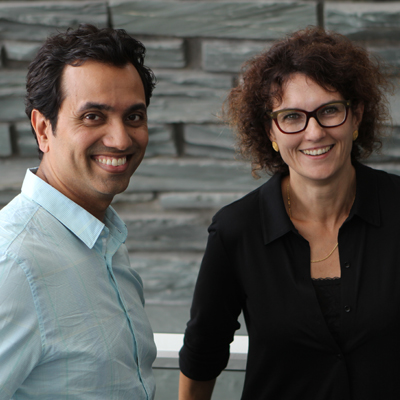Novel nanotherapeutics target plaque formations in the artery, preventing rupture and debilitating heart disease
Heart disease is a “silent killer” that can occur in young and seemingly healthy patients, and for which statistics are startling. In 2013, the American Heart Association attributed one-in-three adult deaths to cardiovascular diseases (CVD), with annual health care costs of $315 billion. By 2030, 44% of the US population are estimated to be afflicted with CVD, indicative of its epidemic footprint. Drs. Kathryn Uhrich and Prabhas Moghe, Professor of Chemistry & Chemical Biology and Distinguished Professor of Biomedical Engineering at Rutgers University, respectively, are pursuing a novel approach to treating this modern day epidemic, particularly the acute coronary syndrome, caused by atherosclerosis where unstable plaques formed by cholesterol deposits lining arteries can rupture. Through several years of collaboration, Drs. Uhrich and Moghe have invented a new class of therapeutic candidates called nanolipoblockers, as a nanotechnology solution to target a novel biological mechanism that will stabilize the most at-risk plaques and prevent such catastrophic coronary episodes.
When plaques form from fat accumulated in specific “hot spots” of the blood vessels, they grow and constrict the blood flow, which can lead to heart attacks or can rupture and cause debilitating strokes and/or heart attacks. The nanolipoblockers that Drs. Uhrich and Moghe have developed are nanoscale particles that can travel through circulating blood and reach cholesterol-rich lesions within the blood vessel; they are designed to treat the major step that leads to plaque disease and protect these hot spots from forming unstable and large plaques. Furthermore, Drs. Uhrich and Moghe hope to design the nanoparticles to also reverse plaque formation. Such important and innovative work continually delivers promising results through the joint effort of Drs. Moghe and Uhrich, who started at Rutgers University on the very same day and have been colleagues for more than two decades. The two collaborators’ friendship and respective expertise in biology and chemistry enable a constant feedback loop in the process of designing and refining molecules with new biological vision to address unmet need, breaking through frontiers in nanomedicine. Their research currently in the preclinical stage, Drs. Moghe and Uhrich aim to develop and mature the technology further to push through clinical trials, to make the molecules even more effective so that they can be translated from bench to bedside.
Current research objectives include:
- Elucidating the power of nanolipoblockers to stabilize potentially vulnerable plaques. These goals will be addressed by designing next generation nanolipoblocker formulations that can prevent lesions from converting to highly inflammatory and “necrotic” in nature. If these goals are met, we can potentially not only prevent atherosclerosis but also rescue advancing lesions and cause their regression. This therapeutic would be the first such technology to accomplish plaque reversal.
- Harnessing the efficacy of nanolipoblockers toward sustained treatment options for patients. Here, they seek to investigate new routes of nanolipoblocker administration for clinical feasibility, to be given orally or subcutaneously. This route would present a significant advance over the current localized delivery or intravenous administration.
- Performing pre-clinical animal studies to understand how these molecules are stabilized in acute heart diseases. The goal here is to translate from cell-based studies to animal models that better recapitulate human disease.
- Developing new imaging modalities to image plaque diseases: By developing a new generation of imaging plaques through nanolipoblockers, Drs. Uhrich and Moghe hope to create the first targeting probe that will identify and detect plaques that are vulnerable and potentially dangerous.
- Extending applications of the nanolipoblocker structures to the brain space for treating neurodegenerative diseases, where similar principles of scavenger receptor blockage can have neuroprotective effects.

Bio
Dr. Kathryn Uhrich is a Professor in the Department of Chemistry and Chemical Biology at Rutgers University, and founder of Polymerix Corporation and other companies. She is Fellow of the American Chemical Society (2014), Fellow of National Academy of Inventors (2013), and recipient of the Common Pathways Award presented by NJ Association for Biomedical Research (2013). Her research centers on polymeric bioactives; specifically, the design of biocompatible, biodegradable polymers that can improve human health.
For more information, rutchem.rutgers.edu/uhrich-kathryn
Dr. Prabhas Moghe is Distinguished Professor of Biomedical Engineering and Chemical and Biochemical Engineering at Rutgers University. He was appointed as the Research Director for the Rutgers School of Engineering and its alliances with Biomedical and Health Sciences. He is Fellow of the Biomedical Engineering Society (2015), International Biomaterials Science and Engineering (2012), and a recipient of the Coulter Foundation Translational Award in Biomedical Engineering. His research is focused on nanomedicine and stem cell biotechnology. www.rci.rutgers.edu/~moghe
In the News
Nature Reviews (2015)
Publications
Videos
Awards
Editor-in-Chief of the Journal of Bioactive and Compatible Polymers
Fellow of the National Academy of Inventors
Coulter Foundation Biomedical Engineering Translational Award
(2010)
Fellow of the International Societies of Biomaterials Science and Engineering, 2012
Coulter Foundation Biomedical Engineering Translational Award, 2010
American Heart Association Grant in Aid Award, 2007
Patents
PCT/US2013/046177: "Macromolecules for Treating Atherosclerosis"
Uhrich, KE and Poree, D. Filed 06/17/13.
US PN 8,192,754: "Micelle Assemblies"
Uhrich, KE and Tian, L. Issued 06/05/12.
SN 13/402,694: "Polymeric Micelles for Reducing LDL in vivo"
Uhrich, KE; Moghe, P; Sparks, S; Hehir, S; Gu, L; Iverson, N, and Plourde, N. Filed 02/22/12.
SN 13/160,371: "Amphiphilic Star-like or Scorpion-like Macromolecules, Various Compositions and Uses Thereof"
Uhrich, KE and Moghe, P. Filed 06/14/11.
PN US2011/0008396 A1: "Compositions and Methods for Treating Cardiovascular Conditions"
Moghe, P; Uhrich, KE; Wang, J; Iverson, N and Plourde, N. Published 01/13/11.
SN 13/402,694: "Polymeric Micelles for Reducing LDL in vivo"
Uhrich, KE; Moghe, P; Sparks, S; Hehir, S; Gu, L; Iverson, N, and Plourde, N. Filed 02/22/12.
SN 13/160,371: "Amphiphilic Star-like or Scorpion-like Macromolecules, Various Compositions and Uses Thereof"
Uhrich, KE and Moghe, P. Filed 06/14/11.
PN US2011/0008396 A1: "Compositions and Methods for Treating Cardiovascular Conditions"
Moghe, P; Uhrich, KE; Wang, J; Iverson, N and Plourde, N. Published 01/13/11.


